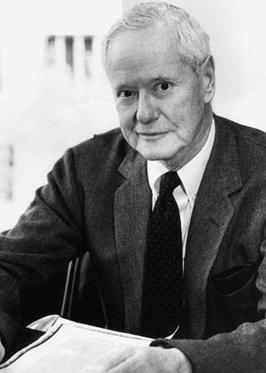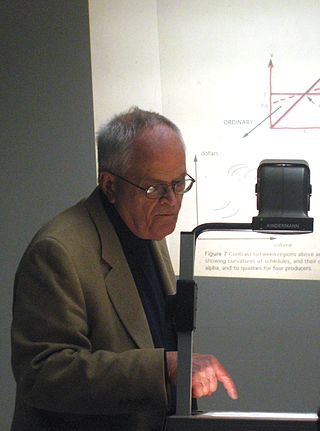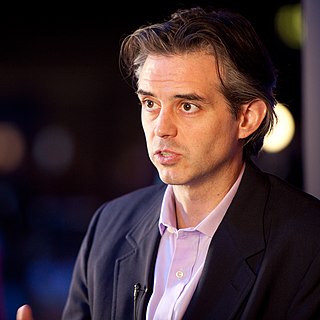Related Research Articles

Robert King Merton was an American sociologist who is considered a founding father of modern sociology, and a major contributor to the subfield of criminology. He served as the 47th president of the American Sociological Association. He spent most of his career teaching at Columbia University, where he attained the rank of University Professor. In 1994 he was awarded the National Medal of Science for his contributions to the field and for having founded the sociology of science.
William Julius Wilson is an American sociologist, a professor at Harvard University, and an author of works on urban sociology, race, and class issues. Laureate of the National Medal of Science, he served as the 80th President of the American Sociological Association, was a member of numerous national boards and commissions. He identified the importance of neighborhood effects and demonstrated how limited employment opportunities and weakened institutional resources exacerbated poverty within American inner-city neighborhoods.

Charles Horton Cooley was an American sociologist and the son of Michigan Supreme Court Judge Thomas M. Cooley. He studied and went on to teach economics and sociology at the University of Michigan, was a founding member of the American Sociological Association in 1905 and became its eighth president in 1918. He is perhaps best known for his concept of the looking-glass self, which is the concept that a person's self grows out of society's interpersonal interactions and the perceptions of others. Cooley's health began to deteriorate in 1928. He was diagnosed with an unidentified form of cancer in March 1929 and died two months later.
Mark Sanford Granovetter is an American sociologist and professor at Stanford University. He is best known for his work in social network theory and in economic sociology, particularly his theory on the spread of information in social networks known as The Strength of Weak Ties (1973). In 2014 Granovetter was named a Citation Laureate by Thomson Reuters and added to that organization’s list of predicted Nobel Prize winners in economics. Data from the Web of Science show that Granovetter has written both the first and third most cited sociology articles.

John Rogers Commons was an American institutional economist, Georgist, progressive and labor historian at the University of Wisconsin–Madison.

Gøsta Esping-Andersen is a Danish sociologist whose primary focus has been on the welfare state and its place in capitalist economies. Jacob Hacker describes him as the "dean of welfare state scholars." Over the past decade his research has moved towards family demographic issues. A synthesis of his work was published as Families in the 21st Century.

Edward Alsworth Ross was a progressive American sociologist, eugenicist, economist, and major figure of early criminology.

Harrison Colyar White is the emeritus Giddings Professor of Sociology at Columbia University. White played an influential role in the “Harvard Revolution” in social networks and the New York School of relational sociology. He is credited with the development of a number of mathematical models of social structure including vacancy chains and blockmodels. He has been a leader of a revolution in sociology that is still in process, using models of social structure that are based on patterns of relations instead of the attributes and attitudes of individuals.
Victor G. Nee is an American sociologist and professor at Cornell University, known for his work in economic sociology, inequality and immigration. He published a book with Richard Alba entitled Remaking the American Mainstream proposing a neo-assimilation theory to explain the assimilation of post-1965 immigrant minorities and the second generation. In 2012, he published Capitalism from Below co-authored with Sonja Opper examining the rise of economic institutions of capitalism in China. Nee is the Frank and Rosa Rhodes Professor, and Director of the Center for the Study of Economy and Society at Cornell University. Nee received the John Simon Guggenheim Fellowship in 2007, and has been a visiting fellow at the Russell Sage Foundation in New York ( 1994–1995), and the Center for Advanced Study in the Behavioral Sciences (1996-1997). He was awarded an honorary doctorate in Economics by Lund University in Sweden in 2013.
Kenneth Herald Parsons (1903–1998) was a professor of agricultural economics at the University of Wisconsin–Madison.
PhD in management is one of the highest academic degrees awarded in the study of management science. The degree was designed for those seeking academic research and teaching careers as faculty or professors in the study of management at business schools worldwide.
Bernhard Ebbinghaus is a German sociologist and comparative social policy expert at the University of Mannheim.

Doug Guthrie is an American academic administrator, sociologist, and China scholar. He is currently professor of global leadership and director of China initiatives at the Thunderbird School of Global Management at The Arizona State University. He was previously the dean of The George Washington University School of Business, and professor of management and sociology and director of executive education and NYU's Stern School of Business. He has also served as a visiting professor of management at the business schools of Columbia, Stanford, Harvard, Emory, and INSEAD and as director of the Business Institutions Initiative at the Social Science Research Council.

Erik Olin Wright was an American analytical Marxist sociologist at the University of Wisconsin–Madison, specializing in social stratification and in egalitarian alternative futures to capitalism. He was known for diverging from classical Marxism in his breakdown of the working class into subgroups of diversely held power and therefore varying degrees of class consciousness. Wright introduced novel concepts to adapt to this change of perspective including deep democracy and interstitial revolution.

Jens Beckert is a German sociologist with a strong interest in economic sociology. The author of books on inherited wealth and the social foundations of economic efficiency, he focuses on the role of the economy in society – especially based on studies of markets – as well as organizational sociology, the sociology of inheritance, and sociological theory. He is director at the Max Planck Institute for the Study of Societies (MPIfG) in Cologne, Germany, and a member of the Berlin-Brandenburg Academy of Sciences and Humanities.

Joseph Rogers Hollingsworth was an American historian and sociologist and emeritus professor of history and sociology at the University of Wisconsin, known for his work on the governance of capitalist economies, especially the American economy.
Alexander M. Hicks is a sociologist who principally studies the causes and consequences of social democracy, corporatism, the welfare state and the sociology of culture, literature and film. He is Emeritus Professor of Sociology at Emory University, where he has been since 1986 following an instructorship and assistant professorship at Northwestern University and a postdoctoral fellowship at the NORC, University of Chicago.[1] Graduate students have included Kali-Ahset Amen, Desmond King, Joya Misra, 2022-2023 President Elect of the American Sociological Association, Dan Slater and Duane Swank. He has delivered invited talks at the Juan Bosch Institute in Madrid, the Max Planck Institute in Cologne, and at universities including the University of Chicago, Columbia, Indiana University, Taiwan's National Chung Chung University, New York University, Stanford and Yale. He has been married to Nancy Ellen Traynor Hicks since 1970; they have a son, Ryan, working in New York City in the nonprofit promotion of affordable housing.
Mark Sheldon Mizruchi is the Robert Cooley Angell Collegiate Professor of Sociology and Barger Family Professor of Organizational Studies at the University of Michigan. He also holds an appointment as Professor of Management and Organizations at the University of Michigan Ross School of Business. His research has focused on the political activity of the U.S. corporate elite over the 20th and 21st centuries. He was influential in the development of social network analysis, and has published research in the fields of organizational theory, economic sociology, and political sociology.
Alessandra Casella is an economist, researcher, professor, and author. Currently, she is an Economics and Political Science professor at Columbia University.
Michael A. Lebowitz was a Marxist economist and Professor Emeritus of Economics at Simon Fraser University in Vancouver, Canada.
References
- ↑ Whitford, Josh (27 October 1998). Dewey, Parsons, and means-to-ends . Retrieved 27 October 2021.
{{cite book}}:|website=ignored (help) - ↑ "Curriculum Vitae • Josh Whitford". Archived from the original on 2015-02-15. Retrieved 2014-10-19.
- ↑ "Josh Whitford". Sociology.columbia.edu. Retrieved 2019-10-24.
- ↑ "Award Abstract #1602900 - Doctoral Dissertation Research: Re-entry organizations and the formally incarcerated". Nsf.gov. Retrieved 2019-10-24.